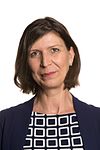The Labour Party is a social democratic political party in the Netherlands.

The Netherlands is a parliamentary representative democracy. A constitutional monarchy, the country is organised as a decentralised unitary state. The Netherlands can be described as a consociational state. Dutch politics and governance are characterised by a common striving for broad consensus on important issues, within both of the political community and society as a whole.
The Christian Union is a Christian democratic political party in the Netherlands. The CU is a centrist party, maintaining more progressive stances on economic, immigration and environmental issues while holding more socially conservative positions on issues such as abortion and euthanasia. The party describes itself as "social Christian".

The Christian Democratic Appeal is a Christian democratic and conservative political party in the Netherlands.

Democrats 66 is a social liberal and progressive political party in the Netherlands, which positions itself in the centre of the political spectrum. It is a member of the Liberal International (LI) and the Alliance of Liberals and Democrats for Europe (ALDE).
An election of Members of the European Parliament representing Netherlands constituency for the 2004–2009 term of the European Parliament was held on 10 June 2004. It was part of the wider 2004 European election. Fifteen parties competed in a D'Hondt type election for 27 seats.

The Party for the Animals is a political party in the Netherlands. Among its main goals are animal rights and animal welfare. The PvdD was founded in 2002 as a single-issue party for animal rights, opposing animal cruelty and the treatment of animals in agriculture. The party then developed into a left-wing, ecological party.

General elections were held in the Netherlands on 22 November 2006, following the fall of the Second Balkenende cabinet. The election proved relatively successful for the governing Christian Democratic Appeal (CDA) which remained the largest party with 41 seats, a loss of only three seats. The largest increase in seats was for the Socialist Party (SP), which went from nine to 25 seats. The main opposition party, the social democratic Labour Party (PvdA) lost nine of its 42 seats, while the right-liberal People's Party for Freedom and Democracy (VVD) and the progressive liberal Democrats 66 lost a considerable portion of their seats, six of 28 and three of six, respectively. New parties, such as the right-wing Party for Freedom (PVV) of former VVD MP Geert Wilders and the animal rights party Party for the Animals (PvdD) were also successful, with the PVV winning nine seats and the PvdD winning two, thereby becoming the first animal rights group to enter a European parliament.

Municipal elections were held in the Netherlands on 7 March 2006. About 11.8 million people could vote in 419 municipalities. Due to municipal reorganisations, 15 municipalities held elections in January 2006 and 24 municipalities held elections in November 2006. In some cities, such as Amsterdam, there were two elections, for the municipality and for the borough councils.

The Netherlands is a European Parliament constituency for elections in the European Union covering the member state of Netherlands. It is currently represented by 31 Members of the European Parliament. Until the 2009 European Parliament election, it excluded the Dutch in the Netherlands Antilles and Aruba.
An election of Members of the European Parliament representing Netherlands constituency took place on 4 June 2009. Seventeen parties competed in a D'Hondt type election for the available 25 seats. For the first time, all Dutch residents of the Netherlands Antilles and Aruba were also entitled to vote in the election.

Early general elections were held in the Netherlands on 12 September 2012 after Prime Minister Mark Rutte handed in his government's resignation to Queen Beatrix on 23 April. The 150 seats of the House of Representatives were contested using party-list proportional representation. The People's Party for Freedom and Democracy (VVD) received a plurality of the votes, followed by the Labour Party (PvdA).

General elections were held in the Netherlands on Wednesday 15 March 2017 to elect all 150 members of the House of Representatives.
GeenPeil is a political initiative by GeenStijl, a Dutch weblog and political party known for its provocative content and its past hoaxes. The name refers to polling results.

General elections were held in the Netherlands from 15 to 17 March 2021 to elect all 150 members of the House of Representatives. Following the elections and lengthy coalition formation talks, the sitting government remained in power.

The third Rutte cabinet was the cabinet of the Netherlands from 26 October 2017 until 10 January 2022. It was formed by a coalition government of the political parties People's Party for Freedom and Democracy (VVD), Christian Democratic Appeal (CDA), Democrats 66 (D66) and Christian Union (CU) after the general election of 2017.
An election of the Members of the European Parliament from the Netherlands was held on 23 May 2019. It was the ninth time such an election had been held in the Netherlands. The number of Dutch seats had been set to increase from 26 to 29 following Brexit, but due to the extension of the Article 50 process in the United Kingdom, the number of seats to be elected remained at 26.

The 2024 European Parliament election in the Netherlands was held on 6 June 2024 as part of the 2024 European Parliament election. It was the tenth time the elections have been held for the European elections in the Netherlands, and the first to take place after Brexit.

Early general elections were held in the Netherlands on 22 November 2023 to elect the members of the House of Representatives. The elections had been expected to be held in 2025 but a snap election was called after the fourth Rutte cabinet collapsed on 7 July 2023 due to immigration policy disagreements between the coalition parties. The incumbent Prime Minister Mark Rutte announced that he would not lead his party into the election and that he would retire from politics.


































